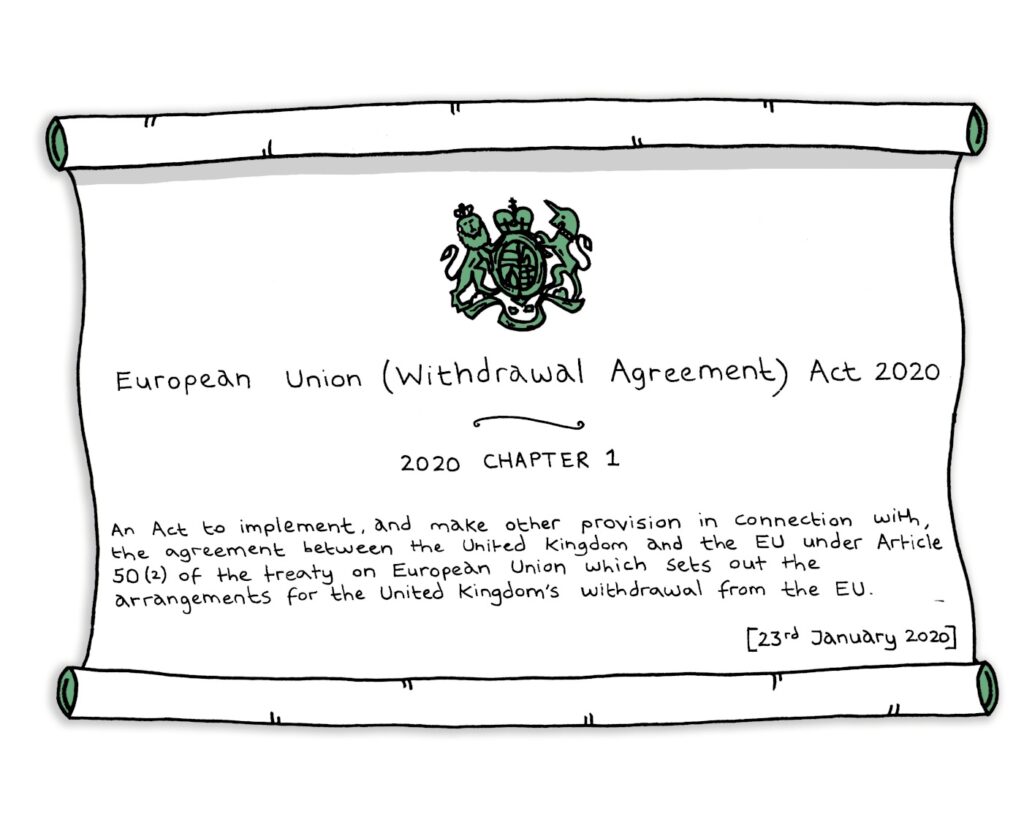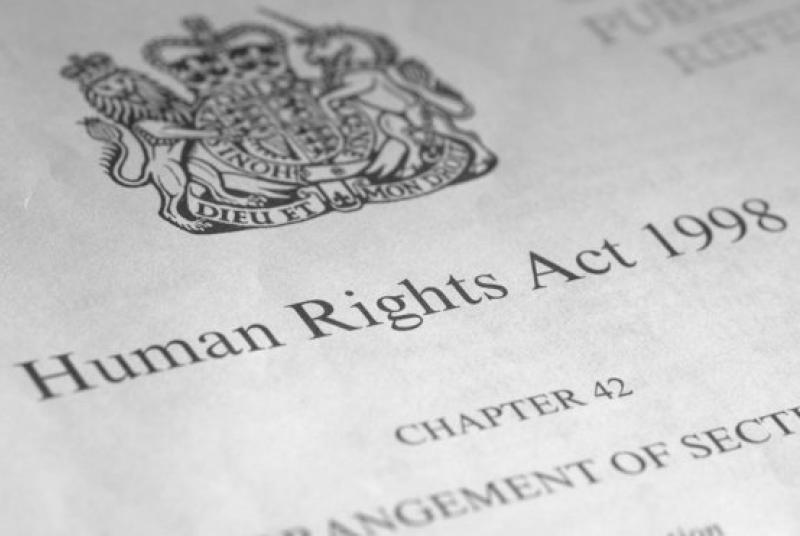
(Credit TL;DR | Artist: Adam Doughty)
For those of you just starting out on your law degrees, you’ll be no doubt looking forward to the getting deeper into some of the issues you’ve seen played out in the news during your recent lifetime. Here, guest writer Anum Shafiq, LLB (Hons) Candidate at the University of London, looks at what led to Brexit and whether it has restored parliamentary sovereignty.
Before reading on, you might find it useful to have a recap on the Brexit timeline of events with the Brexit Comic Strip, taken from The Insider’s Guide to Legal Skills (2nd edn, Routledge 2023) and made available on TL;DR.
Parliamentary sovereignty has long been regarded as the cornerstone of the United Kingdom’s constitutional framework. Yet the constitutional complexities brought about by Brexit have prompted a critical reevaluation of its scope, limits, and practical significance. The classical definition of parliamentary sovereignty reflects a time when Parliament’s authority was legally unlimited and politically unquestioned.

Before the United Kingdom joined the European Union, Parliament held the power to make or unmake any law without being bound by its predecessors or constrained by any higher authority, including the courts. This absolute legal supremacy stood largely unchallenged, shaping how the British constitution functioned in practice and in theory. The UK constitutional structure, traditionally divided into three arms of state, the legislature, the executive and the judiciary. Historically, however, the legislative arm, represented by the Parliament was the most dominant of the three.
This article explores the transformation of parliamentary sovereignty through key constitutional developments, focusing particularly on UK’s membership in, and eventual withdrawal from, the European Union. The discussion will compare the absolute and unquestioned nature of sovereignty in the pre-EU era with its reconstructed and increasingly contested form in the post-Brexit legal landscape.
The Evolution of Parliamentary Sovereignty Through Case Law
The Shifting Meaning of Parliamentary Supremacy: From Absolute Rule to a Judiciary Protected Principle
One of the clearest demonstrations of Parliament’s absolute authority can be seen in Madzimbamuto V Larden – Burke [1969] 1 AC 645. Decided by the Privy Council, the case upheld the supremacy of the UK Parliament to legislate for Southern Rhodesia despite political convention and widespread opposition. Lord Reid famously observed that it might be “unconstitutional for Parliament to do certain things”, that did not mean it was “not legally competent to do them”. This case reflected the classic Diceyan account to the prevailing parliamentary supremacy in the UK at the time: that Parliament was legally omnipotent, and no court or convention could invalidate its legislative will. During this period, the courts remained firmly deferential, reinforcing a vision of parliamentary supremacy that was untouchable.
The judiciary begin to hint that the principle of parliamentary sovereignty might not be limited by the law, but by the constitutional and judicial principles. The case of Jackson V Attorney General [2006] UKHL 56, which challenged the validity of the Hunting Act 2004 passed under the Parliament Acts 1911 and 1949. Although the court upheld the Act, several judges in their obiter comments raised profound constitutional questions. Lord Steyn notably remarked that the supremacy of Parliament “is no longer, if it ever was, absolute”. This hinted at the judiciary’s growing willingness to consider constitutional limits on Parliament, particularly where fundamental rights or constitutional values were at stake.
European Union Membership Era

In 1972, the UK Parliament enacted the European Communities Act 1972, a landmark statute within the UK’s domestic legal system. This Act followed UK’s signing of the Treaty of Accession, and on 1 January 1973, the United Kingdom officially joined the European Economic Community, the precursor to the European Union. From that point onward, European law began to take precedence over domestic legislation, significantly reshaping the traditional understanding of parliamentary sovereignty.
EU Law V UK Law: Practical Challenges
During its time as a member of the European Union, the UK Parliament’s sovereignty faced particular limitations. In cases such as Factortame (No.2) [1991], Costa V ENEL [1964] and Thoburn V Sunderland City Council [2002] the UK courts were compelled to disapply domestic legislation that conflicted with EU law, a significant shift from the Diceyan principle of an all-powerful Parliament. This reflected a deeper constitutional transformation, where the UK had accepted a form of shared sovereignty as a condition of EU membership.
Human Rights Act 1998: Sovereignty through the Lens of Rule of Law

One of the most important constitutional developments during the EU membership period was the Human Rights Act 1998. Although often viewed as part of the European legal influence, the HRA was enacted by the UK Parliament itself, giving domestic effect to the European Convention on Human Rights (ECHR).
Rather than threatening sovereignty, the HRA reflects Parliament’s deliberate choice to legislate in a way that promotes rule of law, ensuring all UK legislation is compatible with basic rights. In this sense, it acts as a “filter” not limiting Parliament’s power, but guiding it toward justice and legal consistency. As Bogdanor notes in The New British Constitution, the Human Rights Act “gave birth to a new British Constitution” one where sovereignty is exercised with restraint and responsibility, rather than unqualified dominance.
The Growing Discontent and the Road to Brexit

(Credit TL;DR | Artist: Adam Doughty)
By the early 2010s, debates over parliamentary sovereignty had become increasingly politicised. Many critics argued that continued membership of the European Union compromised the ability of Parliament to exercise its legislative authority independently. Laws made in Brussels were binding on the UK, often without the same degree of democratic scrutiny traditionally afforded in Westminster. This perception gave rise to a populist sentiment that sovereignty had been “lost” to the EU. The 2016 referendum, framed heavily around “taking back control”, marked the culmination of this discontent. Though, legally advisory, the vote to leave EU was interpreted politically as a mandate to restore parliamentary supremacy.
Ironically, the Brexit process itself revealed further tensions between Parliament, the executive and the judiciary, particularly over who held the authority to initiate withdrawal. These tensions set the stage for landmark constitutional cases such as Miller V Secretary of State for Exiting EU (Miller No.I) and R (on the Application of Miller) V The Prime Minister [2019] UKSC 41 (Miller II).
The Miller Cases: Restating Parliamentary Sovereignty Through the Courts

(Credit TL;DR | Artist: Adam Doughty)
In Miller V Secretary of State for Exiting EU [2017] UKSC 5, the Supreme Court held that the government could not trigger Article 50 without parliamentary approval, affirming Parliament’s central role in the constitutional order. The case reaffirmed that only Parliament can change domestic legislation and that major constitutional changes require democratic legitimacy via parliamentary procedures.
Two years later R (on the application of Miller) V The Prime Minister, another high-profile constitutional challenge, the Supreme Court unanimously found Prime Minister’s advice to prorogue the Parliament as
unlawful. The court emphasized that the executive cannot frustrate or prevent Parliament from carrying out its constitutional functions, even under the guides of political strategy.
Brexit and Beyond: A New Chapter in Sovereignty
The doctrine of parliamentary sovereignty has endured a profound constitutional journey. From Dicey’s classical vision of an all-powered Parliament to the tempered, rights-conscious landscape shaped by EU membership and the Human Rights Act 1998, sovereignty has evolved not weakened. These developments, particularly during the UK’s time within the European Union, tested the limits of domestic supremacy but ultimately refined it.
As the UK reclaims full legislative autonomy post-Brexit, this sovereignty is no longer exercised in vacuum. Instead, it is practiced within the bounds of legality, judicial oversight, and democratic accountability. Landmark rulings such as Miller I and Miller II reaffirmed Parliament’s central role, while simultaneously reinforcing constitutional limits on executive power.
Recent legislative initiatives, including the Rwanda Act 2024 illustrate how Parliament continues to make authorities legal decisions, even amidst controversies. Yet, what distinguishes this era is not the return of unchecked supremacy, but the emerging balance between sovereign will and constitutional responsibility.
Brexit did not simply restore Parliament’s legislative authority; it marked a transition into a more measured, rule of law-driven sovereignty. The UK’s codified constitution, adaptable nature, has withstood external influences while preserving its core. In this post-Brexit chapter, sovereignty is not diminished, it is redefined not as power, but as responsible authority, reflective of modern democratic values.

Guest writer Anum Shafiq is an LLB (Hons) candidate at the University of London with a strong interest in constitutional and public law. She enjoys exploring how key legal principles, such as parliamentary sovereignty, evolve over time and shape modern governance. Passionate about making complex legal concepts accessible, Anum writes to engage both legal and non-legal audiences alike. Outside of her studies, she is dedicated to continuous legal research and
enjoys contributing to discussions on
contemporary constitutional issues.

